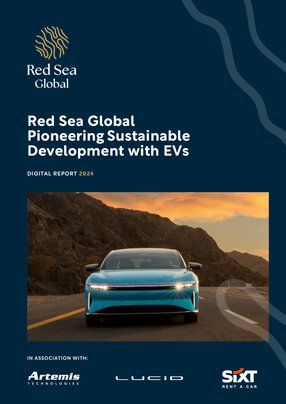Red Sea Global Pioneering Sustainable Development with EVs
Red Sea Global (RSG) is quickly becoming one of the largest integrated development companies in the Middle East - and it aims to become the largest in the world. The real estate development giant is developing several destinations on the west coast of Saudi Arabia, amid turtles and mangroves.
By 2030, when the Red Sea destination reaches full completion, it will be home to 50 hotels across island and inland sites. The destination will also include luxury marinas, golf courses, entertainment, F&B and leisure facilities.
Only 22 of the more than 90 islands at The Red Sea destination are being developed, with nine islands designated as conservation areas. Development is limited to accommodate no more than 1 million visitors a year. The building’s development side of things touches 1% of the entire area, so Red Sea Global is focused on its ethos of sustainability and environmentalism.
Red Sea Global is a cornerstone of Vision 2030, which has several pillars. One of them is a diversification of Saudi Arabia’s GDP, moving away from traditional reliance on oil-centric industries. Tourism is firmly on that map and is one of the main drivers creating jobs for Saudis and developing talented young people into future leaders.
Andreas Flourou has been with Red Sea Global since 2017. Since then, he has taken two main roles - firstly, in leading corporate services, which meant setting up the business, IT admin and ordering HR functions, before moving seamlessly into overseeing mobility operations.
“It’s an absolutely huge destination for us to develop,” says Flourou. “We have already opened two hotels and are well under way to opening further resorts this year and next, with construction actively progressing toward the completion of Shura Island. This is the culmination of Phase 1, which will see 16 hotels. Outside of that, we have more projects in the pipeline, including AMAALA.”
There are thousands of people at The Red Sea site, building infrastructure and hotels.
“We've had to build our own accommodation. Turtle Bay, where I am today, is a community of residential and office buildings, which ultimately will house 14,000 people working in our hotels,” Flourou adds. “Today we accommodate 15,000 construction workers here on site across Turtle Bay and an additional Village for our contractors.”
Beyond the infrastructural and technological feats, RSG's venture is a bedrock for societal impact. The creation of a self-sufficient village not only addresses the accommodation needs of the workforce but also fosters a sense of community. Job creation, particularly in the local context, is a testament to RSG's commitment to developing not just a destination but a sustainable ecosystem that benefits the region's residents.
Breaking new ground with Red Sea Global
His Royal Highness, Prince Mohammed bin Salman bin Abdulaziz, Crown Prince, Prime Minister, and Chairman of the Council of Economic and Development Affairs in Saudi Arabia, is Chairman of the Board at Red Sea Global.
“Our country is rich in its natural resources. We are not dependent solely on oil for our energy needs. Our real wealth lies in the ambition of our people and the potential of our younger generation. They are our nation’s pride and the architects of our future,” said His Royal Highness, in his Vision 2030 leadership message.
CEO John Pagano reports directly to His Royal Highness.
“The project is a fundamental pillar of Vision 2030 and sustainable tourism is one of the areas that His Royal Highness takes great pride in - as do we,” says Flourou. “The economic implications of RSG's venture echo the broader goals of Vision 2030. Beyond diversifying the economy, RSG becomes a catalyst for economic growth, creating a ripple effect that extends to various sectors. The visionary approach adopted by RSG aligns with Vision 2030's ambition to transform Saudi Arabia into a global economic powerhouse.”
The company is constantly being challenged and encouraged to look at things differently, especially in terms of sustainability and construction.
“For example, our overwater villas at Shebara Resort were prefabricated and bought in, which mitigates the environmental impact. Al Wajh Lagoon has 92 islands and RSG is only developing 22, with nine designated as conservation areas.”
Red Sea Global takes a conservative view of where they build, due to the unique local environment. When Pagano assumed the role of CEO, an island was going to be developed, but after a turtle's nest was found on a boat trip there, Pagano and his team got back on the boat and left the island alone.
“That's the ethos that we continue to take in terms of our responsibility and our endeavour to make this a genuinely sustainable and regenerative project,” says Flourou.
The Red Sea goes beyond sustainability to have a regenerative impact on the environment and aims to deliver a 30% net conservation benefit to local ecosystems by 2040. This will be achieved by enhancing biologically diverse habitats including mangroves, seagrass, corals and land vegetation.
“Everything we do is factored around how we protect and improve the environment - and that also goes for our visitors, at full completion,” says Flourou. “We're limiting that to a million a year, which is small in comparison to other destinations. Red Sea Global is proud to protect our environment and try to make it better for all of us.”
Integrating electric vehicles on land, sea and air with sustainable aviation fuel
From the start, Red Sea Global knew that it wanted to be a fully sustainable developer, so the project is completely off the grid, with solar farms docked around the destination, totalling 760,000 panels powering lighting, air conditioning and more. Red Sea Global will deliver 100% renewable energy 24/7 and become the world’s largest destination to run solely on clean power.
“All of our infrastructure has been created from the ground up to be sustainable,” says Flourou. “We have one of the largest battery storage solutions in the world and the most natural progression to that, is to have electric vehicles. All 760,000 photovoltaic panels are in place at the five solar farms that power Phase One of the destination, that is, our first 16 hotels, retail and entertainment venues, and the supporting infrastructure.”
The electric vehicles at Red Sea Global, from cars to boats, are powered by the local solar farms and are completely off grid. Red Sea Global is one of the very first hospitality chains to commercialise their electric cars for guest use - but the marine fleet has been a bit more of a challenge.
“We have one electric vessel and we are also focusing on hydrogen and other forms of propulsion for the next round of vessels,” Flourou adds. “We are the first seaplane company with a certification in Saudi Arabia - that was a fantastic achievement for us!”
For Flourou, all of this is down to adhering to Red Sea Global’s sustainability credentials and practising what it preaches. Yet six months ago, there wasn't a single electric vehicle charger on the west coast of the Kingdom of Saudi Arabia. But now the grid, the largest off-grid EV charging network in the country, is set up for the future for its guests and those who work across the chain.
“We have some great partners here in the Kingdom of Saudi Arabia. To maintain our services, we have built our transportation hub, our mobility hub and our marine service facility. We have our seaplane maintenance & service facility within the airport that allows us to do everything we need to do here on site.”
Red Sea Global created its EV charging network with 2030 in mind. All the islands and holiday destinations are built with enough chargers to make Red Sea Global the largest single-point charging network in Saudi Arabia.
“As we move forward and continue our development, we will become one of the largest charging operators in the world,” says Flourou. “When we start these projects, you look at it as a whole and it can be overwhelming, but we all work towards the same goal..”
Phase two of Red Sea Global’s sustainable mobility initiative is utilising hydrogen energy.
Hydrogen energy and autonomous vehicles
Despite the abundance of solar energy potential in the Kingdom, hydrogen is, Flourou believes, the energy of tomorrow.
“We are developing hydrogen as a part of our mobility strategy and we have worked with several partners across our ecosystem of land, sea, and air to get things going.”
The initial chauffeur-driven fleet of 80 zero-emission battery electric luxury vehicles, features luxury models including Mercedes-Benz EQS and Lucid Air cars, will grow to over 300 EV buses and 300 EV cars over the coming year. This year, the company is working towards building a containerised electrolyser, which will create hydrogen from water and air. But challenges around that have also been tough.
“It's a new technology and a new form of energy, especially here in the region, which has such a dependency on oil,” Flourou notes. “We will be one of the first to use hydrogen vehicles; in fact, we already have hydrogen vehicles on-site alongside hydrogen supply.”
Red Sea Global will test a hydrogen bus, followed by trucks. The company also plans to work with autonomous vehicles.
“We have two autonomous vehicles at Turtle Bay, which are being tested on various routes around our town,” he adds. “We’re learning a lot and as we move forward we have many plans for autonomous vehicles. Not only for guests but also for our staff and potentially some of our logistics.”
As with the rest of Red Sea Global’s work, this will be run with sustainability and cost efficiency in mind.
“Sustainability runs our everyday lives,” says Flourou.
“All of these offerings are very commercial,” says Flourou. “We are very much focused on finding a balance between luxury sustainability and affordability.”
**************
Make sure you check out the latest edition of EV Magazine and also sign up to our global conference series - Sustainability LIVE 2024
**************
EV Magazine is a BizClik brand
- Voltpost Secures Grants for Nationwide Lamppost EV ChargersCharging & Infrastructure
- San Francisco Expands Curbside EV Charging ProgrammeCharging & Infrastructure
- How Amazon hit one Billion Electric Deliveries in the USFleet & Commercial
- Antimony Crisis: Challenges & Opportunities for EVsTechnology



